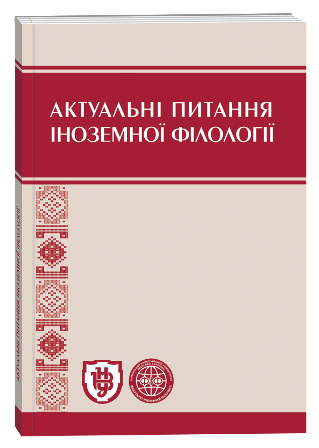ТРЕНДИ У ВИВЧЕННІ ІНОЗЕМНИХ МОВ В ЕПОХУ ПАНДЕМІЇ
DOI:
https://doi.org/10.32782/2410-0927-2022-16-9Ключові слова:
іноземна мова, штучний інтелект, м’які навички, віртуальна реальність, змішане навчання, едьютейнментАнотація
Стаття стосується останніх тенденцій у вивченні іноземних мов в епоху світової пандемії XXI століття. Іноземна мова є складовою професійної культури та компетентності фахівця будь-якої сфери в умовах сучасної глобалізації. Знання іноземних мов допомагає студентам закладів вищої освіти ближче познайомитися з досягненнями інших країн та народів, а також ефективно використати навички говоріння іноземною мовою у майбутній професійній діяльності на міжнародному рівні для встановлення ділових контактів. Мета дослідження – визначити останні тренди у вивченні іноземних мов студентами закладів вищої освіти. Об’єкт дослідження – тенденції у вивченні іноземних мов, що є характерними для закладів вищої освіти в епоху світової пандемії. Методи дослідження: аналіз, систематизація, порівняння, описовий, функціональний, конструктивний та метод перекладу. Практичний досвід в умовах світового карантину через Covid-19 та детальний теоретичний аналіз останніх наукових праць у сфері освіти дозволив виділити основні тренди у вивченні іноземних мов: штучний інтелект, м’які навички, віртуальна реальність, змішане навчання, едьютейнмент. Штучний інтелект у вивченні іноземних мов виконує функції: персоналізація, вимірювання прогресу навчання, мотивація, легка інтеграція. Формування “soft skills” є необхідною складовою ефективного оволодіння іноземними мовами через використання інтерактивних методів та різноманітних форм роботи (в парах, малих і великих групах, індивідуальна робота). Застосування VR технологій передбачає переваги: наочність, безпека, безпосередня участь, фокусування. Змішане навчання є особливо ефективним у вивченні іноземних мов, оскільки воно забезпечує варіативність навчання і враховує індивідуальні потреби студентів через поєднання онлайн та офлайн форм навчання. Едьютейнмент у вивченні іноземних мов – це урахування психологічних потреб студентів через традиційні й електронні книги, музику, фільми, освітні ігри, комп’ютерні та відеоігри, електронні тренажери, енциклопедії, веб-квести, вікі та блоги. Для ефективного опанування навичок говоріння, письма, читання та аудіювання з мови, яку вивчаємо, є необхідним постійне врахування новітніх тенденцій в освітньому глобалізаційному просторі. Перспектива подальших досліджень передбачає детальний аналіз теоретичних основ сучасних тенденцій та опис їх практичного застосування в опануванні конкретної іноземної мови, зокрема, англійської.
Посилання
Андріянова Г. І., Крутін О. З., Скора Н. А., Шульга І. М. Концепція змішаного навчання (blended learning). Впровадження моделі змішаного навчання для вивчення англійської мови. Collection of scientific papers “SCIENTIA”. URL: https://ojs.ukrlogos.in.ua/index.php/scientia/article/view/8262/8234
Арестов А. В. Особливості застосування технології віртуальної реальності у навчальному процесі. URL: https://ela.kpi.ua/bitstream/123456789/27306/1/Arestov_magistr.pdf
Безлюдний О. І., Безлюдна В. В., Щербань І. Ю., Комар О. С. Досвід використання змішаного навчання на заняттях з англійської мови у закладах вищої педагогічної освіти. Інформаційні технології і засоби навчання. 2019. Т. 73. № 5. С. 86–100.
Вікторова Л. В., Кочарян А. Б., Мамчур К. В., Коротун О. О. Застосування штучного інтелекту та чат-ботів під час вивчення іноземної мови. Інноваційна педагогіка. № 32. Т. 2. 2021. С. 166–173.
Державна національна програма «Освіта» («Україна XXI століття») / Затверджено постановою Кабінету Міністрів України від 3 листопада 1993 р. № 896. URL: http://zakon2.rada.gov.ua/laws/show/896-93-%D0%B
Климнюк В. Є. Віртуальна реальність в освітньому процесі. Збірник наукових праць Харківського національного університету Повітряних Сил. 2018. № 2 (56). С. 207–212.
Корнюш Г. В. Формування м’яких навичок у студентів закладів вищої освіти в контексті навчання іноземних мов. URL: https://periodicals.karazin.ua/language_teaching/article/view/15689/14567
Системи штучного інтелекту в плануванні, моделюванні та управлінні : підручник для студ. вищих навч. закл. / За ред. Л. С. Ямпольського, Б. П. Ткача, О. І. Лісовиченко. К. : ДП «Вид. дім «Персонал», 2011. 544 с.
Порохова О. Є. Сутність і проблематика штучного інтелекту. Одеса, 2019. 30 с.
Фірсова Л. Що таке ед’ютейнмент і чому не варто боятися «ігрових» дітей. URL: https://osvitoria.media/experience/navchannya-rozvagoyu-metodomedutainment/
Фісунова Л. Edutainment як принцип навчання. URL: https://www.creativeschool.com.ua/edutainment/
Christensen M. Horn H. Staker is K-12 Blended Learning Disruptive? An introduction of the theory of hybrids. San Francisco CA, USA : Clayton Christensen Institute, 2013. URL: https://www.christenseninstitute.org/publications/hybrids/







